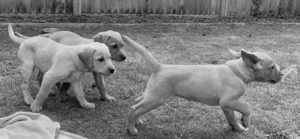
Modelled by Lola. (R) Collar: models’ own
Latest from the courts
The First Tier Tribunal (FTT) case of Westland Horticulture Limited highlights the complexities of; the VAT treatment of food, animal foodstuffs, seeds, crops and how these are all held out for sale. One only has to consider the myriad VAT liabilities of seemingly similar products sold at, say, a garden centre, to realise that this is can be a VAT minefield.
Examples
- Food for a budgerigar is standard rated, but pigeon grit is zero rated.
- Peanuts and sunflower seeds are zero rated, unless advertised as wild bird food when they are standard rated
- Food for a Labrador is standard rated, unless the dog is used as a gun dog when it is zero rated
- Lavender seeds are zero rated. Daffodil bulbs are standard rated.
This is a very small list of examples where the VAT treatment of precisely the same product may change depending on use, and/or where a slight difference of the type of goods can have a surprising tax outcome.
A full guide to garden centre liabilities here
The case
HMRC state in Public Notice 701/38 para 5.3
“Most grass seed is zero-rated because of the extensive use of grass as animal feed. This includes supplies to and by garden centres, local authorities and grass seed to be grown on set aside land.
But pre-germinated grass seed and turf are not used for the propagation of animal feed and are therefore standard-rated.”
Zero rating is available per VAT Act 1994, Schedule 8, Group 1, item 3: “…seeds or other means of propagation of plants comprised in animal feeding stuffs”
In Westland’s case, it sold a product called Aftercut Patch Fix, which, although was 90% grass seed, also contained sowing granules and an ingredient called Clinoptilolite which, apparently, neutralises the effects of excess salts and ammonia found in pet urine. The grass seed was of various varieties and is not in itself any different to “ordinary” grass seed sold without any additives.
Having a new puppy, I can verify the damage one small hound can do to lawns and this is a product I may will need to invest in. The product was held out (see below) to help fix damage to grass that, in my case, a small Lola (and larger Libby) can do.
Decision
Unsurprisingly, the judge ruled that the product was standard rated on the grounds (no pun intended) that it was clearly intended to be used on people’s gardens rather than to be planted to grow animal food. Therefore, the zero rating provided via PN 701/38 does not apply.
The Product was physically different to generic grass seed as it contained more than just seed. The product (as distinct from the seed within the product) is therefore not a similar product to generic grass seed for the purposes of fiscal neutrality.
Commentary
A discrete issue you may think. However, the tax in this single case amounted to over half a million pounds. It illustrates how much care must be taken in establishing the correct liability of; food, animal foodstuff, pet food and ornamental versus edible plants, seeds, bulbs, shrubs and trees.
One of the salient tests is how the goods are “held out for sale” (held out)
Held out means the:
- way a product is labelled, packaged, displayed, invoiced, advertised or promoted
- heading under which the product is listed in a catalogue, web page or price list
In this case, the packaging and description on the appellant’s website was a major factor in the decision.
Manufacturers and retailers may need to review how their products are described, what the contents are and how they are displayed in-store. Even the location of the goods, how they are displayed, and the signage used may affect the VAT treatment (it doesn’t matter if I buy zero rated working dog food and feed it to my two who are never going to do a day’s work in their life….).
